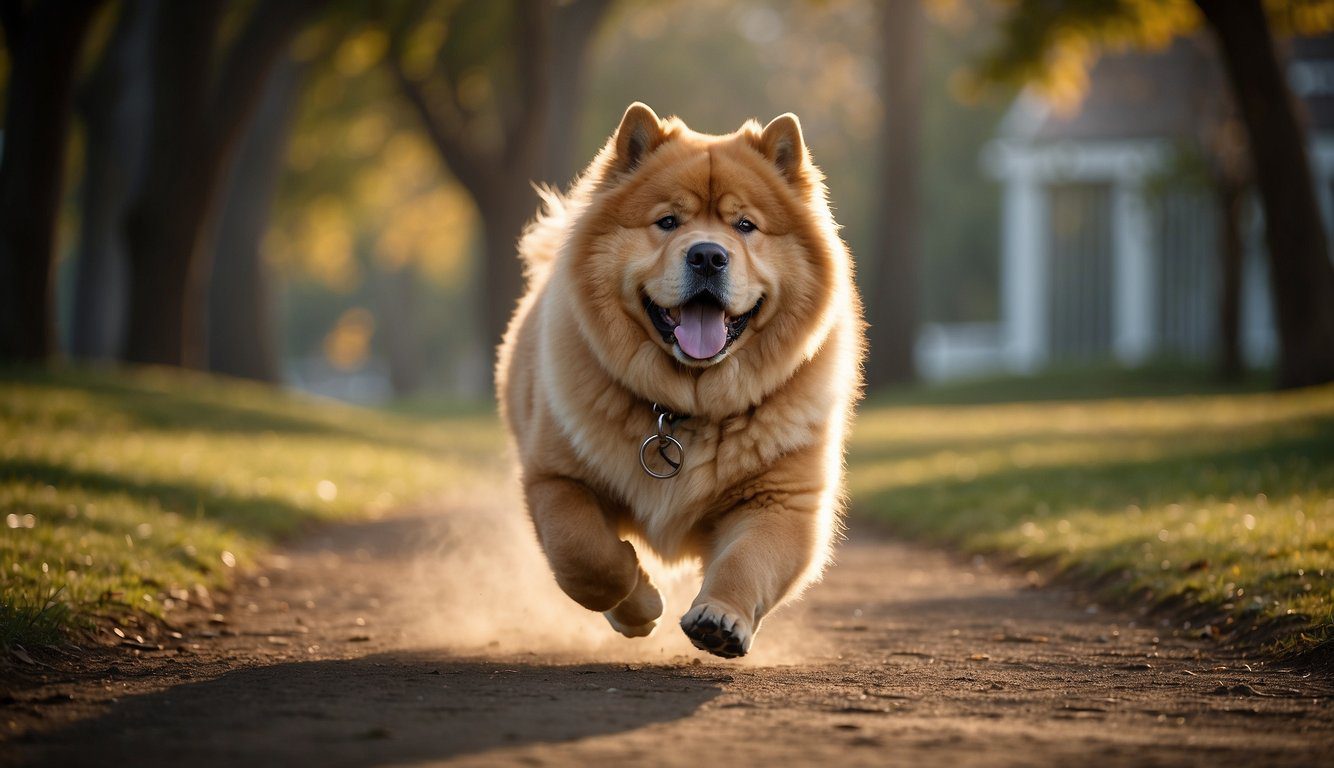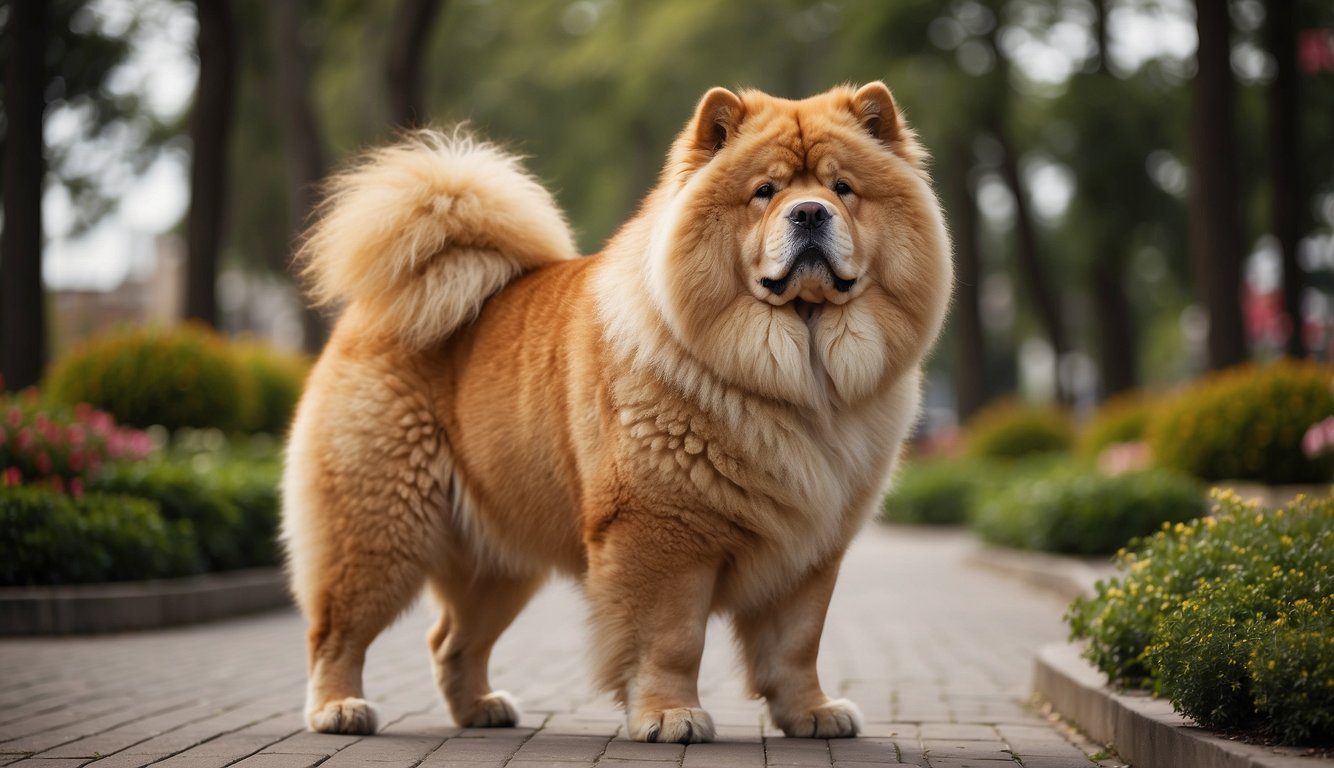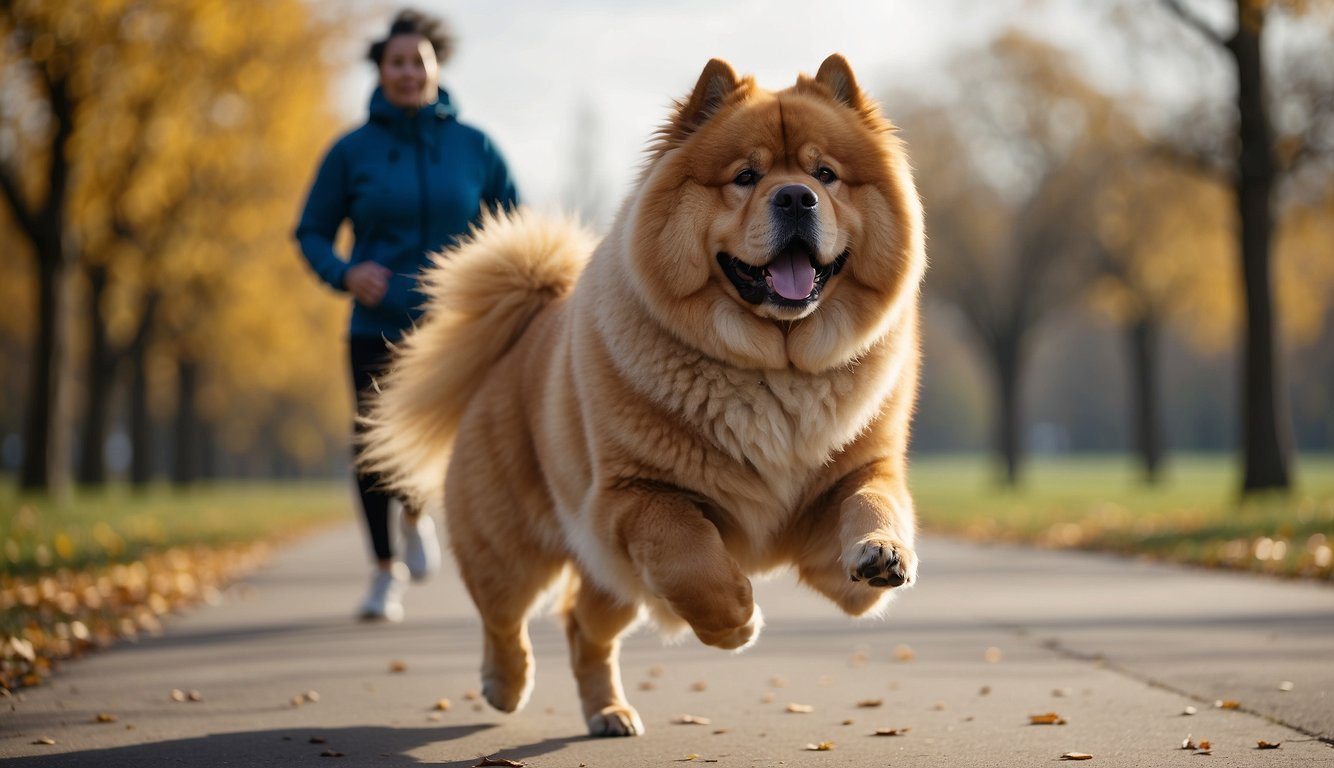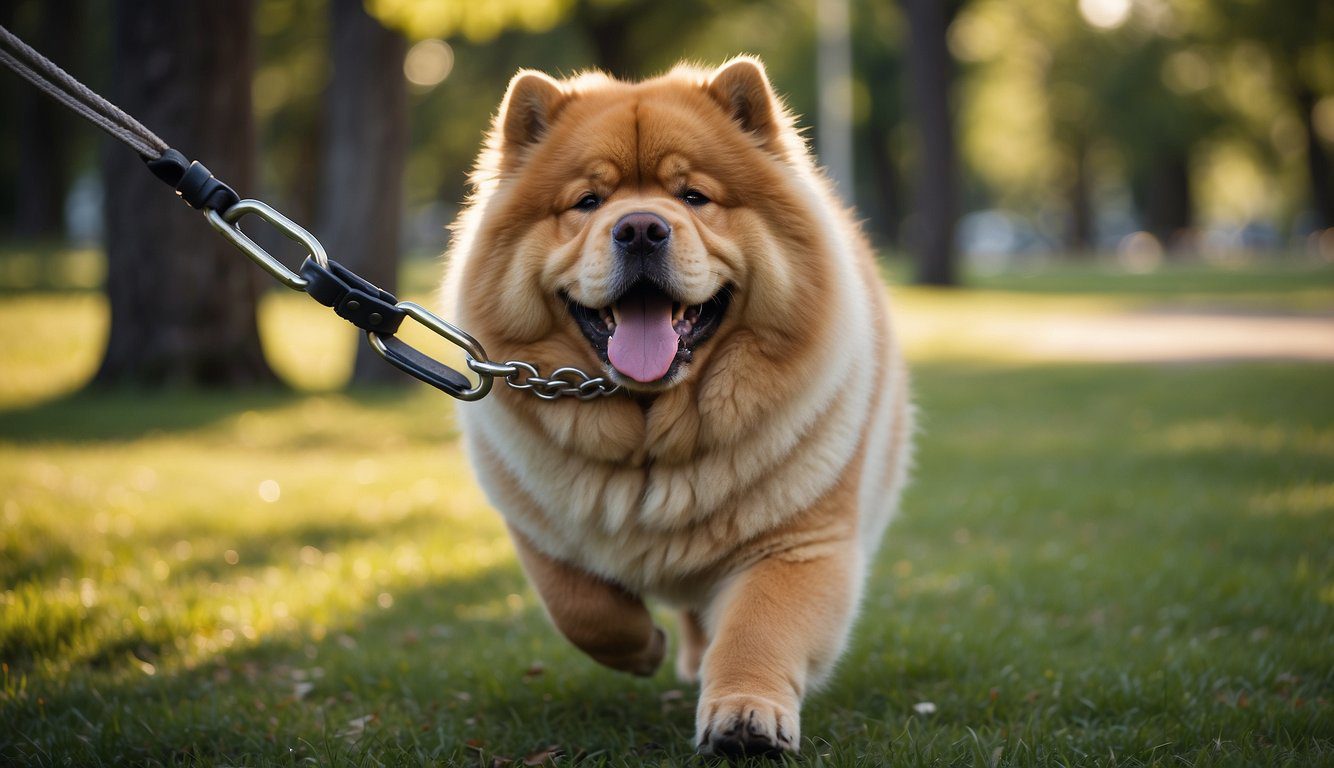What to Know
Chow Chow Exercise Needs
When it comes to keeping your Chow Chow healthy and happy, exercise plays a crucial role.
Chow Chows need about 45 to 60 minutes of exercise each day to maintain their health and avoid problems like obesity. This might seem like a lot, but breaking it up into shorter sessions can make it more manageable.

Chow Chows need about 45 to 60 minutes of exercise each day. This might seem like a lot, but breaking it up into shorter sessions can make it more manageable.
Regular exercise doesn’t just keep your Chow fit; it also strengthens the bond between you.
Activities like walking, jogging, or even a playful game of fetch can help meet their physical needs.
Keeping your Chow active is not only good for their body but also for their mental health.
Imagine the joy of coming home to a happy and tired Chow Chow after a fun-filled day.
This guide will help you understand their exercise needs and how to meet them effectively.
Ready to dive in and learn more about keeping your furry friend in top shape?
Key Takeaways
- Chow Chows need 45 to 60 minutes of daily exercise.
- Exercise improves both physical and mental health.
- Break activities into shorter sessions to manage time better.
Understanding Your Chow Chow’s Traits

Chow Chows are unique and have some distinct traits that set them apart from other dog breeds.
Their regal appearance and aloof demeanor are part of their charm. They are also known for their thick coat and blue-black tongue.
Breed Characteristics
Chow Chows are dignified dogs with a calm and confident air. Their blue-black tongue is one of their most unique traits. They also have a thick coat that requires regular grooming to keep it in good condition.
These dogs are often aloof and can appear distant. While they are loyal to their family, they might not be very friendly with strangers.
Their independent nature means they might not be the most affectionate dogs, but they are very loyal and protective of their loved ones.
A typical Chow Chow weighs between 45 to 70 pounds. They stand firmly and have a sturdy build.
Their resemblance to a small bear, with a stocky and furry appearance, makes them look both adorable and formidable.
Health Considerations
Chow Chows come with some specific health considerations.
They are prone to hip dysplasia, which can cause pain and mobility issues. Maintaining a healthy weight is crucial to prevent putting extra stress on their joints.
Their thick coat can cause overheating, especially in hot climates. Regular grooming can prevent skin issues and help them stay cool.
It’s important to provide a shaded area and plenty of water during hot weather.
These dogs can also be prone to eye problems like entropion, where the eyelid turns inward.
Regular vet check-ups can catch and treat issues early, ensuring a longer, healthier life for your Chow Chow.
Creating an Exercise Regimen

Designing a suitable exercise regimen for a Chow Chow involves considering their age, types of physical activities they enjoy, and incorporating mental stimulation.
Let’s dive into the specifics to ensure your Chow Chow remains healthy and happy.
Assessing Needs Based on Age
Puppies have different exercise needs compared to adult or older dogs.
Puppies are full of energy but their joints are still developing. Short, frequent play sessions are ideal.
For older dogs, gentle exercise is key. Short walks help keep their joints active without overexerting them.
Monitoring how they respond to exercise will guide you in adjusting the routine to suit their comfort level.
Each stage in a Chow Chow’s life demands different exercise adjustments to cater to their health and energy levels.
Types of Physical Activities
Different kinds of physical activities cater to Chow Chow’s exercise needs.
Walking is the simplest yet effective way. Aim for 45 to 60 minutes of walking daily.
For more active dogs, hiking or moderate runs are good options.
Playful activities like fetch or tug-of-war can be integrated into daily routines.
Individual preferences vary; some dogs might enjoy more active play, while others prefer gentler activities.
Using a diverse range of exercises ensures your Chow Chow’s overall fitness and prevents boredom.
Incorporating Mental Stimulation
Chow Chows are intelligent and require mental stimulation alongside physical exercise.
Puzzle toys and interactive games challenge their minds.
Hide-and-seek or treasure hunt games engage their senses and keep them mentally sharp.
Training sessions can also be mentally stimulating. Teaching new commands or tricks not only makes them think but also strengthens the bond between you and your pet.
Combining mental and physical activities in their regimen contributes to a balanced and enriched lifestyle for your Chow Chow.
Interactive Activities and Games
Chow Chows need to stay active and engaged to be happy and healthy. Explore these interactive activities and games to keep your Chow Chow entertained both indoors and outdoors.
Indoor Engagement
On rainy or cold days, keep your Chow Chow busy indoors.
Puzzle toys are a fantastic option; they challenge your dog’s mind and reduce boredom. Hide treats in the toy and let your dog figure out how to get them.
Another great indoor game is Tug-of-War. Use a sturdy rope toy and make sure to let your Chow Chow win sometimes to encourage positive reinforcement.
Fetch can also be an indoor activity if you have enough space. Use a soft toy to prevent damage to furniture.
Training sessions are perfect indoors too. Teach new commands or tricks using treats and praise.
Outdoor Adventures
When the weather is nice, take your Chow Chow on exciting outdoor adventures.
Daily walks or jogs are essential for this breed, aiming for at least 30 minutes each day. Vary your route to keep your dog interested and engaged.
Play Fetch in a secure yard or open space. This classic game helps with exercise and obedience as your dog learns to retrieve and return items.
Swimming is another excellent activity, especially during hot weather.
Chow Chows may enjoy cooling off while getting their exercise. Always supervise and ensure the water is clean and safe.
Training and Obedience
Training sessions can be both stimulating and beneficial for your Chow Chow.
Obedience training helps with discipline and strengthens your bond. Use positive reinforcement, like treats and praise, to reward good behavior.
Teaching interactive games such as “Find It” can be very engaging.
Hide a toy or treat and let your Chow Chow use their nose to locate it. This game boosts their problem-solving skills and keeps them active.
Incorporate socialization into training.
Meeting other dogs or people can be part of your exercise routine, enhancing their social skills.
Enroll in training classes that use positive methods to encourage learning and discipline.
Harsh methods should be avoided as they’re not productive and can harm the bond between you and your Chow Chow.
Make each training session enjoyable and rewarding for both of you.
Addressing Behavioral Considerations
Keeping your Chow Chow mentally stimulated and avoiding destructive behaviors are crucial for their well-being. Consistent training and structured activities are key to achieving this balance.
Preventing Boredom and Destructive Behaviors
Chow Chows often get bored quickly, which can lead to destructive behaviors.
Simple activities like daily walks, playtime, and interactive toys can help prevent boredom. Providing variety in their exercise routine ensures they remain engaged.
Chow Chows, with their independent nature, may benefit significantly from activities that challenge them mentally.
Puzzles and training games can keep their minds active. Rotating toys and introducing new activities periodically can also keep things interesting.
Negative behaviors such as chewing and digging usually stem from a lack of stimulation.
Regular exercise and attention can drastically reduce these tendencies.
Owners should be attentive and proactive in keeping their Chow Chows occupied with meaningful activities.
Cultivating Patience and Consistency
Training a Chow Chow requires patience and consistency.
These dogs can be stubborn and sometimes may not respond immediately to commands.
Using positive reinforcement, such as treats and praise, encourages good behavior.
It’s important to start training early and maintain a routine.
Short, regular training sessions work best. Consistency in commands and expectations helps in faster learning.
Owners must remain calm and patient throughout the training process.
Creating a calm training environment makes it easier for the dog to focus.
Gradually increasing the difficulty of tasks while maintaining consistency helps Chow Chows adapt and learn better.
A dedicated, steady approach is essential for successful training and behavior management.
Nutrition and Exercise

Proper nutrition and exercise are essential for maintaining your Chow Chow’s health. Balancing their diet with their activity level can help prevent weight gain and other related health issues.
Balancing Diet with Activity Level
Chow Chows typically have moderate energy levels.
To keep them healthy, owners must balance their diet with their exercise routine. Exercise helps burn calories, reducing the risk of weight gain and obesity.
A diet rich in protein supports muscle development and energy.
Protein sources include chicken, beef, and fish.
Healthy fats are essential for brain function and energy.
Incorporate Omega-3 and Omega-6 fatty acids into their meals, found in fish oils and flaxseed.
Carbohydrates provide energy but should be given in moderation.
Oats, sweet potatoes, and brown rice are good options. Avoid high-sugar and processed foods, as these can lead to unnecessary weight gain and health issues.
A well-balanced diet and regular exercise will keep your Chow Chow in optimal condition.
Understanding Caloric and Nutrient Needs
Understanding your Chow Chow’s caloric needs is crucial for maintaining a healthy weight. An average adult Chow Chow needs around 1,000 to 1,300 calories per day, depending on their size and activity level.
Puppies and highly active adults may require more calories. Monitor their weight and adjust their diet as needed.
If your Chow Chow is gaining weight, reduce their caloric intake slightly and increase their exercise.
A balanced diet must include protein, healthy fats, and carbohydrates. Protein should make up about 25-30% of their diet, while fats should account for 10-15%. Carbohydrates should fill the rest, providing energy and aiding digestion.
Keep an eye on your dog’s weight and consult a vet if you notice significant changes. This helps ensure they stay healthy and happy.
Conclusion

Taking care of a Chow Chow’s exercise needs is key to ensuring they stay healthy and happy. Regular physical activity helps build a strong bond between the owner and the dog.
Daily Routine: Aim for at least an hour of activity daily. This can include two to three short walks and some playtime. It’s a manageable routine that fits most lifestyles.
Positive Reinforcement: Use treats and praise to encourage your Chow Chow. This will make exercise more enjoyable for them and boost their confidence.
Patience and Love: Remember, patience is essential. Every Chow Chow is different. Some may need more time to adjust to a new routine. Always approach their exercise with love and care.
Incorporate these steps into your daily routine to keep your furry friend happy and healthy. Engaging in these activities will not only meet their physical needs but also strengthen your relationship.
FAQs

Chow Chows require moderate exercise and attention to maintain their health and happiness. They often have specific needs and behaviors that owners should be aware of.
How often should one schedule walks for their Chow Chow to meet its exercise requirements?
Chow Chows typically need 45-60 minutes of exercise daily. This can be split into two or more shorter walks. For example, a morning and evening walk can help meet their needs and keep them happy.
What kind of behavior issues might one anticipate when not meeting a Chow Chow’s exercise needs?
Without enough exercise, Chow Chows can become bored and may develop destructive behaviors. Chewing furniture, excessive barking, and even aggression can indicate that your Chow Chow needs more physical activity.
Could you shed some light on Chow Chows’ activity levels compared to other breeds?
Compared to breeds like Border Collies or Labradors, Chow Chows are relatively low to moderate in energy. They are not built for high-intensity activities or long runs due to their stocky build and unique gait.
What are some good exercises for a Chow Chow to ensure they receive adequate physical activity?
Activities like daily walks, brief jogs, or games such as fetch and tug-of-war can be beneficial. Shorter play sessions and even swimming can be good alternatives if outdoor time needs to be limited.
Are Chow Chows typically considered an inactive breed, or do they require regular exercise?
Chow Chows are not as active as some other breeds, but they still need regular exercise to stay healthy. About 45-60 minutes of moderate activity daily helps them maintain their physical and mental well-being.
What essential care practices should be implemented to satisfy Chow Chow’s daily physical activity needs?
Daily walks, regular playtime, and mental stimulation are key.
Monitoring their activity levels and adjusting exercise intensity as needed can prevent exhaustion or injury.
Owners should always be mindful of their Chow Chow’s limits and needs.

